Freedom of markets, buying and selling, and their limits during the era of the Messenger, peace and blessings be upon him, “an economic study”
Keywords:
huriyat , aiswaq , baye , shira'i, eahd alrasul salaa allah ealayh wasalamAbstract
Man possesses many mental talents that enable him to think, work, sell, buy, invest, import, export, consume, and then spend and save for himself by virtue of the freedom of private ownership or personal ownership. All of this is evidence of the Islamic economic freedom granted to the individual according to what Islam has approved, with limits accepted by reason and logic and accepted by Sharia and law. Exploitation, embezzlement, theft, disputes, and tampering. The Islamic religion has forbidden, in general and in detail, harm and damage. There are Qur’anic verses and many Prophetic hadiths that confirm this. Islam does not restrict the individual. Rather, he called on him to work, to love work, to respect time, and to earn good money, to practice various types, methods, and economic operations, represented by economic activities, including industrial, commercial, and agricultural, to invest resources and wealth, and the blessings of God Almighty, with the means of production he possesses, in order to obtain the greatest benefit as a result of Islamic economic freedom, which does not mean the exclusion of the state. From the follow-up and monitoring of economic activities, merchants, market owners, and measures and weights by state officials and clergy; Because economic freedom is one of the foundations of the Islamic system and the actual application emphasized by the Islamic religion. The study included two axes: the first axis: the concept of economics and freedom in language and terminology, and the second axis included economic patterns that proved economic freedom during the era of the Messenger Muhammad, peace and blessings of God be upon him, according to the Qur’an and the Sunnah, including: the freedom to give in charity and not impose amounts on the goods that are bought and sold, the freedom to choose a place and build a market, the freedom to enter markets from Before all, with the remembrance of God, His Majesty, and other obligations, and the freedom to buy and sell, except for the hour when selling is disliked: the freedom to buy and sell with the aim of staying away from religion and market disputes, the freedom to buy and sell and export goods and commodities in accordance with the principle of tolerance, the freedom to buy and sell in accordance with the prohibition of fraud in the markets, and the freedom to refrain from buying and selling goods. Unsuitable fruits and freedom to buy and sell away from receiving and promoting







